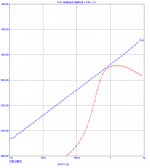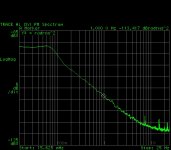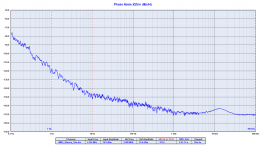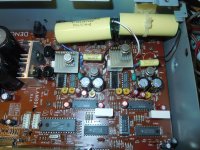I have no business partners since I have no business.
Of course, I cannot share the oscillator you have published since it was very poor.
Of course, I cannot share the oscillator you have published since it was very poor.
What do measurements have to do with it? I assume the recording engineer and producer used ears only on the final product.
The measurements failed because people felt the the amp with worse measurements more realistic than the one with better measurements.
Do you think we perceive any difference if we listen to the same live event with Daniil Trifonov playing the Steinway grand piano?
If so the measurements are totally useless since our target in audio reproduction is totally different, so we would need custom measurements according to our brain.
If not so there is something wrong in the modern measurements since several people keep preferring system with worse measurements.
And not according to their personal taste but according to the ability of the audio system to reproduce the live event as realistic as possible.
Last edited:
Scott,
I'm not looking for any effect, I merely like to listen to the Steinway and to the voice of Mary Black as close as possible to what I have listened in the live concert.
Pandemic aside and according to my possibility, I like to cross the world looking for the best live concerts I can found, like this in your town a few years ago
BSO Warhorses Well Led - The Boston Musical Intelligencer
For me audio is the means of listening to music as close as possible to the live event.
Since the recording almost certainly does not sound like the live concert, trying to make your equipment reproduce something that does not sound like the original will only end up with a poorly tuned effects box.
You realise for him power amplifier distortion doesn't matter but he can hear close in phase noise 120dB down. Cult of Clock meets Cult of SET.
Every clique here has their own opinions, and no surprise, they are often polar opposites.
Hi Andrea,
It is clear that what you hear at home is nothing like the real event at all. It can't be given the equipment you are using. However, you like it better than the real event or you would be using something more accurate. You like the effects your system imparts to the recorded material. That's fine. Realize that it is purely your taste in music and not at all accurate.
Measurements are absolute, accurate and you clearly don't have access to anything that is current technology. Okay, no problem. But, reading your recent posts, I'm afraid that you are wrong, completely wrong and out to lunch.
I dare you to A-B your system against anything real. Your system will fail that test miserably. I have seen, heard and tested similar systems. It's fine that you like the sound, but it isn't accurate. To me, your equipment is anything but musical.
News flash. Most people who do take measurements listen as well and love music. I like to hear something close to the real recording, and I worked in recording studios, world class ones. I know what the mix sounds like. My system is much closer than yours will ever be.
You have your own opinion that is without a reference. That is cool. Keep it to yourself. The only thing that has failed here is your logic and lack of being able to do a realistic test. You have a simplistic view of how things are done that allows massive errors to dominate your conclusions.
In short. You're wrong, mistaken and willing to ignore evidence to the contrary. Oh well, maybe some day you will learn. A full orchestra on your system breaks down and sounds confused, not clear and nothing like a real event. I know this from listening to similar systems (many of them), so I know.
Have a nice life. Let us know when you finally learn the truth.
-Chris
It is clear that what you hear at home is nothing like the real event at all. It can't be given the equipment you are using. However, you like it better than the real event or you would be using something more accurate. You like the effects your system imparts to the recorded material. That's fine. Realize that it is purely your taste in music and not at all accurate.
Measurements are absolute, accurate and you clearly don't have access to anything that is current technology. Okay, no problem. But, reading your recent posts, I'm afraid that you are wrong, completely wrong and out to lunch.
I dare you to A-B your system against anything real. Your system will fail that test miserably. I have seen, heard and tested similar systems. It's fine that you like the sound, but it isn't accurate. To me, your equipment is anything but musical.
News flash. Most people who do take measurements listen as well and love music. I like to hear something close to the real recording, and I worked in recording studios, world class ones. I know what the mix sounds like. My system is much closer than yours will ever be.
You have your own opinion that is without a reference. That is cool. Keep it to yourself. The only thing that has failed here is your logic and lack of being able to do a realistic test. You have a simplistic view of how things are done that allows massive errors to dominate your conclusions.
In short. You're wrong, mistaken and willing to ignore evidence to the contrary. Oh well, maybe some day you will learn. A full orchestra on your system breaks down and sounds confused, not clear and nothing like a real event. I know this from listening to similar systems (many of them), so I know.
Have a nice life. Let us know when you finally learn the truth.
-Chris
Copy and paste like the following examples?And since you are so able to copy and paste, please copy and paste my reply too.
Steinway grand piano is more realistically reproduced by a Katana DAC
Steinway piano is more realistically reproduced by a Katana DAC
Steinway and a Kawai are the same thing.
Steinway and the Kawai are the same.
But there is a business he wants to promote / nurture.Keep it to yourself.
Hi Chris,
in my experience the measurements didn't tell me what a piece of audio equipment sounds like.
During the last 40 years (unfortunately I'm not a teenage) I listened to stuff that measured perfectly and sounded bad to my ears (the Steinway was a Kawai), while I have listened to other stuff which measured worse but I found them more realistic and natural (the Steinway was almost a Steinway).
So I prefer to take a device home and listen to it in my system for days or weeks rather than rely on the measurements.
The measurements can be a starting point but they are not sufficient to understand what we perceive and what we like.
I can't listen to an audio device that I don't like, even if it measures very well.
I got tired after 10 minutes.
I fully share that point of view, measurements matter but they do not say everything.
One system may sound good even though it may not measure as well, and another may measure excellent and be tiring and / or unnatural. The timbre of each instrument is what counts and I don't know of many measuring instruments that can measure that, if any.
Es divertido ver cómo algunos sacan sus carnets antes de ingresar al club, aunque no sea necesario, pero el sentido de pertenencia es muy fuerte en las personas.
No importa que hiciste durante X años, dónde trabajaste, a que cargo llegaste, etc, nada!
Lo único de verdad irrebatible es que ningún equipo sonará igual que el evento en vivo porque ya te fuiste del escenario a escucharlo en tu casa. Entonces, todas las especulaciones deberían ser sobre cuál sonido de un sistema dado se parece más a la realidad que se ha escuchado en vivo y quedo registrado a traves de un montón de procesos tecnológicos.
It is fun to see how some take out their cards before entering the club, although it is not necessary, but the sense of belonging is very strong in people.
It doesn't matter what you did for X years, where you worked, what position you came to, etc, nothing!
The only truly irrefutable thing is that no team will sound the same as the live event because you've already left the stage to listen to it at home. So all the speculation should be as to which sound from a given system most closely resembles the reality that has been heard live and is recorded through a lot of technological processes.
No importa que hiciste durante X años, dónde trabajaste, a que cargo llegaste, etc, nada!
Lo único de verdad irrebatible es que ningún equipo sonará igual que el evento en vivo porque ya te fuiste del escenario a escucharlo en tu casa. Entonces, todas las especulaciones deberían ser sobre cuál sonido de un sistema dado se parece más a la realidad que se ha escuchado en vivo y quedo registrado a traves de un montón de procesos tecnológicos.
It is fun to see how some take out their cards before entering the club, although it is not necessary, but the sense of belonging is very strong in people.
It doesn't matter what you did for X years, where you worked, what position you came to, etc, nothing!
The only truly irrefutable thing is that no team will sound the same as the live event because you've already left the stage to listen to it at home. So all the speculation should be as to which sound from a given system most closely resembles the reality that has been heard live and is recorded through a lot of technological processes.
And if not, delete all the posts that talk about the importance of the room, the reflections, etc !
Of course, I cannot share the oscillator you have published since it was very poor.
I don’t recall publishing any oscillator, I’ve build some in another life, but nevertheless, how do you know “it was very poor”? Have you listened to it?
What defines good sound in audio replaying devices? Is it something that fits a particular listener's preference?I fully share that point of view, measurements matter but they do not say everything.
One system may sound good even though it may not measure as well, and another may measure excellent and be tiring and / or unnatural. The timbre of each instrument is what counts and I don't know of many measuring instruments that can measure that, if any.
I agree, but measurement on an equipment in isolation correlates to the quality of that particular equipment, but does not necessarily reflects the quality of produced sound. Perhaps measurement on the acoustic would correspond better with perceived quality of the sound. AFAIK successful producers of products that people use to enjoy themselves (wine and spirit as an example) usually research extensively on customer preference to develop and understand the correlation to their internal standards.Measurements are absolute, accurate ...
Perhaps measurement on the acoustic would correspond better with perceived quality of the sound.
Yes. This is the ultimate test. There are a number of reasons why some distortion, depending on where and how it is introduced, may make the reproduced sound more similar to the original event.
The measurements failed because people felt the the amp with worse measurements more realistic than the one with better measurements.
But you only quoted one measurement which was one THD %, probably taken at one frequency and power...
Here are two THD vs output level plots, which circuit would sound better?
Also special challenge for the crowd: can you guess what the circuits are? Hint: they're very simple.
Attachments
Last edited:
Hi Chris,
you are talking about my "system" but just to inform you: my system does not exist.
I thought I was clear when I wrote that we are developing the whole system.
The only part we have completed is the oscillator for the digital to analog conversion.
We have measured it using one of the most suitable tool available today (so we have invested in the modern equipment capable of supporting our claims and you should know it's very expensive) and we have drawn the conclusion: we have designed a state of the art device, one of the best oscillators on the whole market (by mesurements comparison).
Since you trust measurements this is a fact.
I believe it's a little difficult to predict if your system is much closer than mine will ever be, since I don't know what system you are using and you don't know what system we are designing.
Finally, since I'm not a professional can you please tell me who are the seasoned designers and techs who actually work in the field at high levels you have pointed out in a previous post?
Thank you
Andrea
you are talking about my "system" but just to inform you: my system does not exist.
I thought I was clear when I wrote that we are developing the whole system.
The only part we have completed is the oscillator for the digital to analog conversion.
We have measured it using one of the most suitable tool available today (so we have invested in the modern equipment capable of supporting our claims and you should know it's very expensive) and we have drawn the conclusion: we have designed a state of the art device, one of the best oscillators on the whole market (by mesurements comparison).
Since you trust measurements this is a fact.
I believe it's a little difficult to predict if your system is much closer than mine will ever be, since I don't know what system you are using and you don't know what system we are designing.
Finally, since I'm not a professional can you please tell me who are the seasoned designers and techs who actually work in the field at high levels you have pointed out in a previous post?
Thank you
Andrea
I don’t recall publishing any oscillator, I’ve build some in another life, but nevertheless, how do you know “it was very poor”? Have you listened to it?
Just to recall, the poor oscillator compared to a state of the art oscillator (6.144 MHz).
Attachments
I can't listen to an audio device that I don't like, even if it measures very well.
I got tired after 10 minutes.
What is "measures very well"?
What kind of measurement?
Hi Andrea,
Okay, but the systems you do refer to are not very good to listen to. I have heard many examples properly set up. Its the nature of a SET design, and while they are loved by some with simple music, they are anything but accurate.
To be fair, I have also heard many conventional systems that cost a lot of money that were also not accurate, and certainly not nice to listen to either. However, once a well designed system using well designed components are used, the accuracy is quite good and they are a joy to listen to. This includes tube and solid state equipment.
I have often been presented with "upgraded" equipment that sounds awful. I have one in front of me now, a Denon DCD-1630G. A terrible upgrade job that used the accepted audiophool upgrade parts. Step one is to back out of the upgrade. Step two, since I got it for me, is to install the proper parts, some upgraded (but have real performance enhancements and actually fit the PCB properly). The end result will be a very nice sounding piece of equipment. This one is destined for my bedroom system.
It also needs a new laser head and motor, plus the clamper repaired. Once done it will appear much closer to stock and the actual disc reading performance will be on standard. The audio performance should be reasonably good, better than average for this model.
I also have machines with tube outputs. Designed in by the factory. Performance is good and they sound okay, but the distortion is far above what I feel is reasonable, and the solid state ones I have sound much better. Some people love the tube output models and I will probably sell them, but they sure are not accurate!
Audio electronics has been my life for over 40 years. I'm also a Journeyman electronic test instrument calibration and repair technician, so I have a very good understanding of both those worlds. I listen carefully to what goes across my bench, so I am not a measurements only guy. That is actually an insulting viewpoint as no people I know who measure equipment only go by that. We always listen as well. If the two don't agree, then a measurement is wrong, or something in the listening test is wrong. But when something measures well and sounds good, then you have something.
BTW, we don't go blindly for low distortion numbers. Tube electronics has a characteristic type of distortion that can sound good. Knowing what this is allows us to measure tube electronics and go for better sound with instruments that agrees with what you hear. I own tube electronics that I listen to, and I am designing a tube amp. I'm afraid I don't fit into one of your slots as a measuring only guy. I still play vinyl on good equipment and love it!
So measuring equipment and listening to it should agree with each other. If not, one or both have issues. They work together and attempts to separate them robs you of good yardsticks to keep you on track. Ignoring either can allow you to go far astray and end up with a bad sounding system.
-Chris
Okay, but the systems you do refer to are not very good to listen to. I have heard many examples properly set up. Its the nature of a SET design, and while they are loved by some with simple music, they are anything but accurate.
To be fair, I have also heard many conventional systems that cost a lot of money that were also not accurate, and certainly not nice to listen to either. However, once a well designed system using well designed components are used, the accuracy is quite good and they are a joy to listen to. This includes tube and solid state equipment.
I have often been presented with "upgraded" equipment that sounds awful. I have one in front of me now, a Denon DCD-1630G. A terrible upgrade job that used the accepted audiophool upgrade parts. Step one is to back out of the upgrade. Step two, since I got it for me, is to install the proper parts, some upgraded (but have real performance enhancements and actually fit the PCB properly). The end result will be a very nice sounding piece of equipment. This one is destined for my bedroom system.
It also needs a new laser head and motor, plus the clamper repaired. Once done it will appear much closer to stock and the actual disc reading performance will be on standard. The audio performance should be reasonably good, better than average for this model.
I also have machines with tube outputs. Designed in by the factory. Performance is good and they sound okay, but the distortion is far above what I feel is reasonable, and the solid state ones I have sound much better. Some people love the tube output models and I will probably sell them, but they sure are not accurate!
Audio electronics has been my life for over 40 years. I'm also a Journeyman electronic test instrument calibration and repair technician, so I have a very good understanding of both those worlds. I listen carefully to what goes across my bench, so I am not a measurements only guy. That is actually an insulting viewpoint as no people I know who measure equipment only go by that. We always listen as well. If the two don't agree, then a measurement is wrong, or something in the listening test is wrong. But when something measures well and sounds good, then you have something.
BTW, we don't go blindly for low distortion numbers. Tube electronics has a characteristic type of distortion that can sound good. Knowing what this is allows us to measure tube electronics and go for better sound with instruments that agrees with what you hear. I own tube electronics that I listen to, and I am designing a tube amp. I'm afraid I don't fit into one of your slots as a measuring only guy. I still play vinyl on good equipment and love it!
So measuring equipment and listening to it should agree with each other. If not, one or both have issues. They work together and attempts to separate them robs you of good yardsticks to keep you on track. Ignoring either can allow you to go far astray and end up with a bad sounding system.
-Chris
Attachments
The only part we have completed is the oscillator for the digital to analog conversion.
Is it TWTMC or have you made a new version?
- Status
- Not open for further replies.
- Home
- Member Areas
- The Lounge
- Sound Quality Vs. Measurements



